Effects of Noise Pollution from Ships on Marine Life
Just as much salvation has been brought to the world due to developments in the marine industry, in terms of better technology, there is no denying that the natural balance of things has had to pay the price. With ship transportation picking up pace, its environmental effects are now surfacing. Among them, the impact of noise pollution on marine life is highly prominent.
More than 500 studies have established that humans are responsible for altering the ocean soundscape. Harsh noises have impacted marine animals who flee their original habitats, away from their feeding grounds, and end up dead or hurt. Even the arctic, once a refuge, is no longer a pristine landscape.
What is Ocean Noise?
Ocean noise is the sounds from human activities that act as stressors to the marine ecosystem. Also known as anthropogenic noise pollution, it impacts marine mammals, their behavior, physiology, and reproduction cycle and directly affects their mortality rates. According to research published in Journal Science, ocean noise has a much greater impact on marine life than previously understood.
This knowledge has allowed policymakers and stakeholders to take appropriate actions. For instance, in 2014, the International Maritime Organization issued several guidelines to reduce noise pollution in seas resulting from military sonars or seismic surveys, propellers, pile driving, offshore wind farms, naval exercises, marine tourism, commercial fishing, and oil and gas exploration.
Noise Pollution- A Grave Problem
Ocean noise pollution is an addition to the already pressing problems on marine habitats such as global warming, plastic pollution, acidification, and overfishing.
The problem is serious since sound waves travel faster in water, covering greater distances than they would on land while traveling through the air. And secondly, marine life is extremely sensitive to sounds, even low-frequency noise, which is hardly audible to humans.
Marine mammals rely on underwater sounds for essential life functions like searching for prey, avoiding predators, locating offspring, and finding a mate. Hence, insufficient mechanisms to safeguard them against underwater noise pollution disrupt marine life.
Sources of Noise Pollution In Seas and Oceans
Sources of ocean noise pollution include everything from the ship noise to the low-frequency sonar ”sounds” used extensively in submarine detection or even the seismic air gun noise from oil and gas exploration or even commercial shipping traffic and coastal jet ski traffic. Studies have shown that while these ”sounds” may have no impact on humans, in marine life, they can be detrimental. The population of cetaceans (whales and dolphins) has declined in areas prone to such noise pollution from ships.
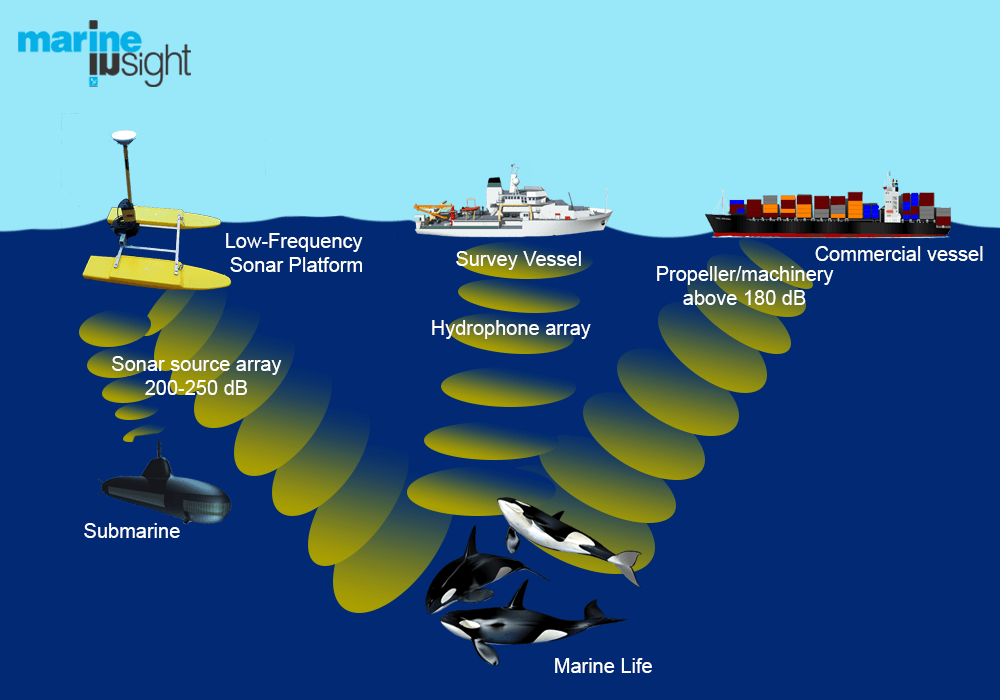
Impact of Ocean Noise on Marine Ecosystems and Biodiversity
The death of marine animals can occur hours after exposure to extreme underwater noise. For example, whales can die soon enough due to strandings. A relatively common environmental impact of noise pollution is breaching themselves shortly after a tactical sonar exercise. Such beaching has been reported in regions like Greece, Madeira, Hawaii, Spain, and the coastal US, where sonar exercises are common.
Mass stranding of giant squids in coastal areas of Spain between 2001 and 2003 showed how grave the implications of noise pollution in marine life could be. Dislocation or movement of marine animals to newer locations is also one of the many ocean noise pollution effects. While this may seem like a survival mechanism, studies conducted for a follow-up on these animals aren’t’ that promising as most animals fail to acclimatize to the new environment, not to mention the loss of diversity in many regions.
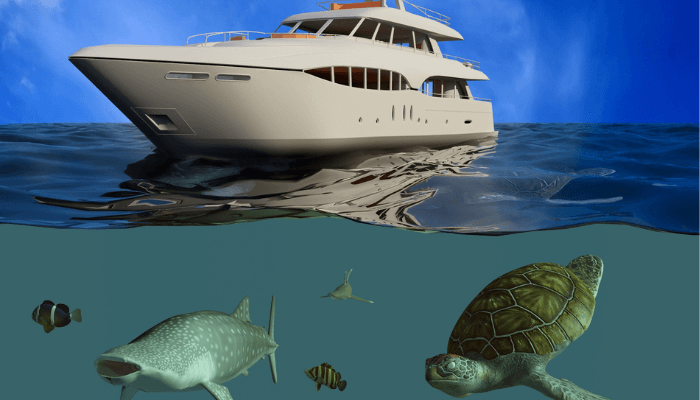
Underwater noise pollution is more painful than anything else for the animals. Most animals are alarmed by the alien sounds. The deaths can occur due to hemorrhages, changed diving patterns, migration to newer places, damage to internal organs, and an overall panic response to the foreign sounds.
There is also a disruption in the regular communication between marine animals due to underwater noise pollution. This means animals prone to noise pollution are unable to call their mates, look for food or even make a cry for help.
Many marine animals like the fish (rockfish, herring, san eel, cod, blue whiting, etc.) show extensive damage to their ears upon exposure to seismic air guns even up to several kilometers. Exposure to noise during the embryonic stage increases the sensitivity of fish to noise impact, increasing the mortality rates at the time of birth and the development of genetic anomalies.
The migration to new areas not only affects the marine diversity balance but indirectly affects humans too. A decreased catch in many fish species like herring, cod, and blue whiting, especially in areas susceptible to noise pollution from ships, has been noticed.
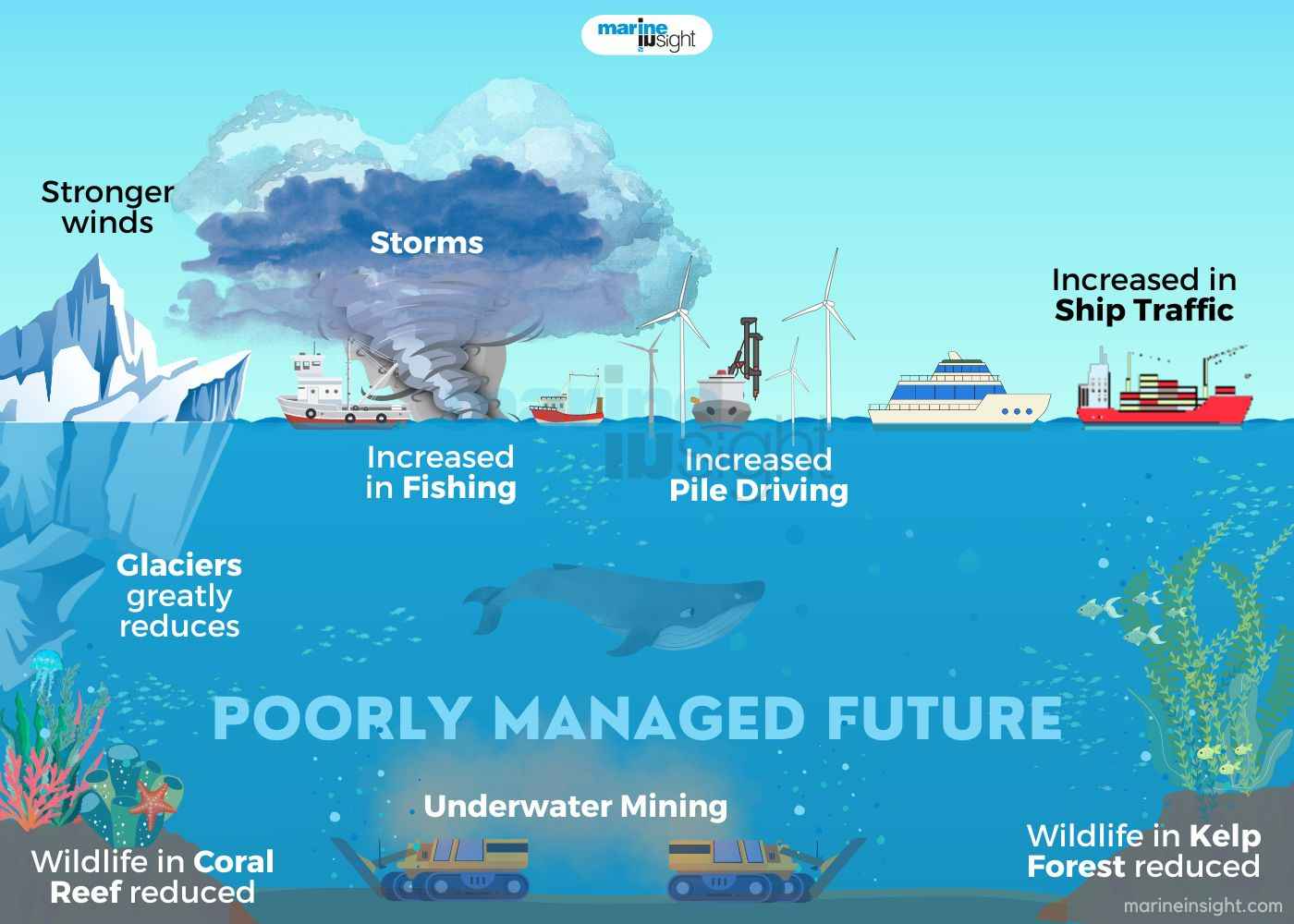
The sensitivity of various marine animals to ocean noise pollution varies. While cetaceans like whales and dolphins may show a greater resistance, soft-shelled species like mollusks, prawns, fish, etc., are much more sensitive. However, it is essential to note that as many as 24 cetacean species have shown adverse effects of noise pollution in the ocean.
In all, about 55 marine species have been noted to have suffered due to exposure to the sound of varying frequencies. These include several whale species, including- sperm whales, humpback whales, beaked whales, mink whales, pygmy sperm whales, killer whales or Orcinus orca, sea bass, pink snapper, goldfish, cod, and haddock, bluefin tuna, squid, and invertebrates like lobster, crabs brown shrimp, etc.
Mass strandings of Kemp’s ridley sea turtles and bottlenose dolphins became common on the beaches near the Gulf of Mexico when explosives were deployed to remove many oil platforms in offshore waters.
A Few Ways To Save Marine Lives from An Array of Noises
Several organizations have assessed underwater noise in busy international waterways and seas such as the Mediterranean. Researchers point out that managing sea traffic could be one way of limiting the impact of noise on marine life. The Vancouver Fraser Port Authority in British Columbia has developed a unique and workable program. Ships are encouraged to take a different route, away from the endangered southern native killer whales’ feeding grounds. The volunteers suggest slow speeds for huge ships crossing certain waters in southwest British Columbia.
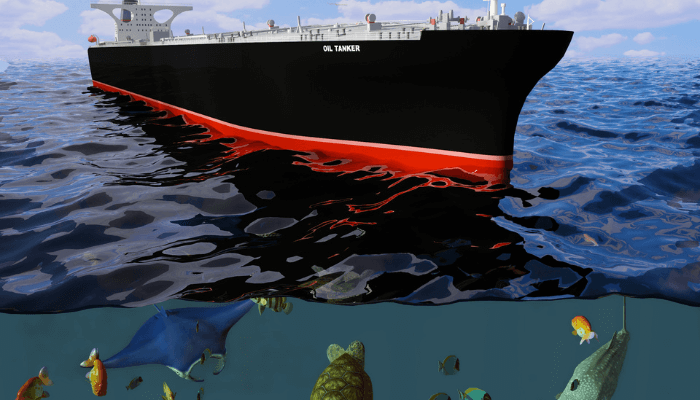
A new review, co-authored by 25 international researchers who studied 10,000 academic papers on the issue of anthropogenic noise, revealed that the noise could not be ended altogether. Still, sufficient measures can be taken to decrease it considerably. The principal author, Carlos Duarte, a professor at the King Abdullah University of Science and Technology, Saudi Arabia, mentioned that the paper was written as the issue of underwater noise was not being discussed majorly. Also, study co-author and marine ecologist Kirsten Thompson says that the report talks about the problem and ways to solve it and achieve a healthy ocean.
Shipping engineers suggest using propellers to decrease cavitation or those tiny bubbles which make a loud noise when they burst. Most cruise ships have electric motors to drive propellers and reduce noise levels. Also, most ship-quieting technologies increase the vessel’s fuel efficiency and decrease its environmental impact.
Ocean Noise Pollution levels during Covid-19
Interestingly, during covid 19 pandemic, when the world was undergoing a strict lockdown, and human movement was restricted, several sightings of wildlife on city streets and roads were reported. It was the time when wildlife enjoyed their habitat without human interference.
The same was the case with ocean life. According to a few studies, fewer cargo ships and container carriers were plying in the water bodies, and the seas and oceans sounded like they did almost 150 years ago. Marine mammals returned to their original habitats, and some fish populations thrived due to decreased fishing. Many coral populations were also recovering, and rates of marine pollution also reduced during that period.
These two years carry an important lesson. Only if human beings restrict their consumption, reduce their unnecessary needs and demands, and stop being wasteful while trying to balance modernization and technological advancements with the conservation of nature we can surely go a long way.
Conclusion
There is a reason why the ocean is called the ”silent world”. This world has its own beautiful sounds which are calm and harmonious. Studies are being conducted to understand the effects of noise pollution on marine life and find reasonable mitigation methods. Until then safety through prevention is our best shot at keeping the sanctity of this ”silent world” intact.
Frequently Asked Questions About Ocean Noise Pollution
1. What causes marine noise pollution?
Human activities like commercial shipping, offshore construction, sonars, seismic surveys, etc., cause noise pollution in the water bodies.
2. How does sound pollution affect marine animals?
It hampers marine animals’ survival ability by increasing their anxiety levels. Many end up hurt or dead as they relocate to new regions, unable to find mates or food.
3. Is marine sound pollution studied?
The impact of marine noise pollution has not been a subject of many major studies. Only a few species and areas have been extensively studied.
4. How was ocean noise pollution during covid times?
Interestingly, oceans sounded like they did 150 years ago during covid. This was because of few ships plying in the oceans and seas.
5. What can we do to reduce the impact of ocean noise pollution?
Though it cannot be ended completely, noise pollution can be reduced by using sound-absorbing ship technologies and avoiding breeding grounds of certain marine species.
You might also like to read
- 11 Threats to Marine Environment You Must Know
- The Marine Environment Protection Committee (MEPC) at a Glance
- Effects of Dredging on the Marine Environment
- Measures Taken During Shipboard Operation for the Safety of Ship’s Crew, Cargo, and Marine Environment
- How Efficient Cargo Handling can be Helpful for the Marine Environment?
- How to Become a Marine Biologist: Requirements and Necessities
Disclaimer :
The information on this website is for general purposes only. While efforts are made to ensure accuracy, we make no warranties of any kind regarding completeness, reliability, or suitability. Any reliance you place on such information is at your own risk. We are not liable for any loss or damage arising from the use of this website.

About Author
Zahra is an SEO-Strategist & a Technical Writer with over 5 years of experience crafting top-tier content for the shipping world. From news, articles, ebooks, blogs and marketing pieces to industry white papers, she has written it all and now brings that experience to her role as Senior Editor. She makes complex maritime stories clear, sharp, and engaging.
Disclaimer :
The information on this website is for general purposes only. While efforts are made to ensure accuracy, we make no warranties of any kind regarding completeness, reliability, or suitability. Any reliance you place on such information is at your own risk. We are not liable for any loss or damage arising from the use of this website.
Related Articles
⚓️ Enhance Your Knowledge. Prevent Accidents. Stay Safe at Sea.
1. eBooks for Engine Department
Master machinery operations, troubleshooting, and safety procedures with expertly written guides tailored for marine engineers. Prevent costly breakdowns and onboard accidents through practical knowledge.
👉 Explore Engine Department eBooks
2. eBooks for Deck Department
Sharpen your seamanship, navigation, and cargo-handling skills with real-world case studies and practical insights designed for deck officers and cadets.
👉Discover Deck Department eBooks
3. eBooks on Electrical Fundamentals & Issues
Understand marine electrical systems, identify potential faults, and prevent onboard electrical failures with step-by-step explanations from industry experts.
4. Pocket Guides for Quick Reference
Compact, handy, and loaded with essential checklists—perfect for on-the-go reference during operations and emergencies at sea.
5. Combo Packs to Save Big
Access multiple expert eBooks at discounted prices. Ideal for professionals seeking complete safety and operational knowledge across various ship departments.
6. Digital Maritime Courses – Learn at Your Own Pace
Upgrade your competence with Marine Insight Academy’s online courses. Learn from industry professionals anytime, anywhere, and become a safer, smarter seafarer.
Subscribe To Our Daily Newsletter
By subscribing, you agree to our Privacy Policy and may receive occasional deal communications; you can unsubscribe anytime.

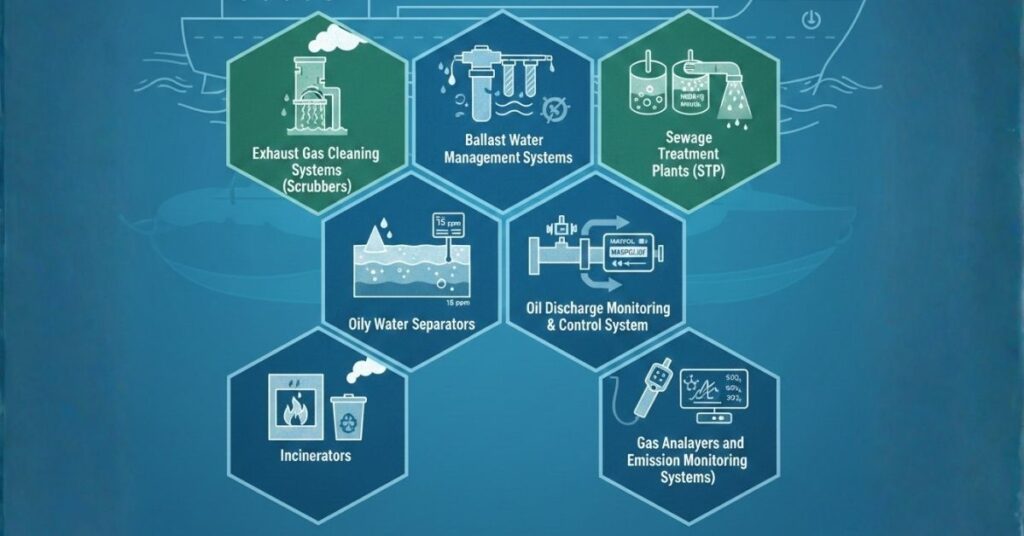






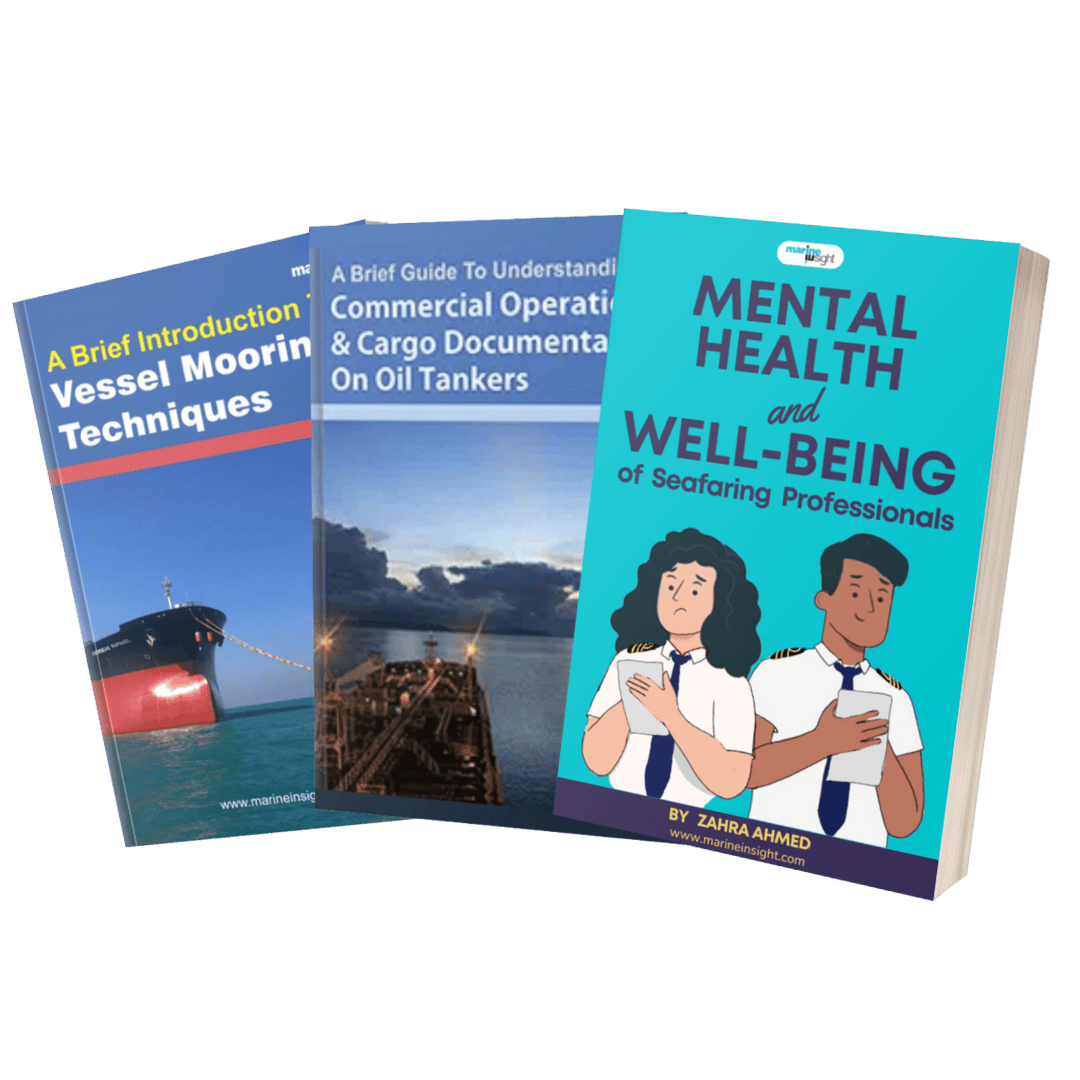
i love our tutorials
That’s sad. I didn’t know whales would beach themselves when subjected to certain levels of noise. That must be why there are regulations on sound. I bet businesses get noise consultants when their operations could cause noise pollution.
this game doo doo
this is awesome
Need more information regarding the marine noise pollution in my area
Need more information about the same as planing to launch a device which can track the SHIPS SAFE RPM
This is coOoOoOoOoOoOoooooOoOoOoOoooOoOl stuff, perfect for my argumentative essay. thanks dudes. Also, i like whalers.
Was trying to carryout research on Noise pollution and I like what I just read. Thanks
@Egbegi: Glad You found it useful ??